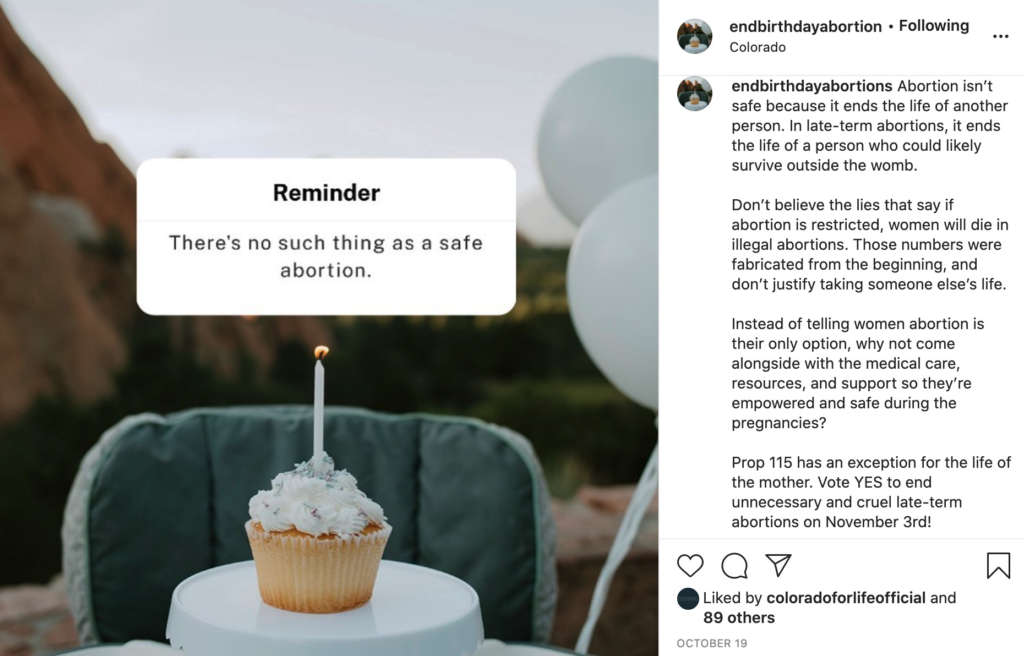Supporters of a Colorado ballot initiative that would ban abortion at 22 weeks falsely claimed in a social media post that deaths associated with illegal abortions are “fabricated.”
The Instagram post from the group End Birthday Abortions states, “Don’t believe the lies that say if abortion is restricted, women will die in illegal abortions. Those numbers were fabricated from the beginning, and don’t justify taking someone else’s life.”

Proposition 115 would ban abortion in Colorado at 22 weeks with no exceptions for rape, incest, a lethal fetal diagnosis, or non-fatal health reasons.
Backers of the ballot initiative have for months been attempting to assure voters that the measure wouldn’t put a patient’s health at risk, despite evidence to the contrary and pushback from the medical community.
The assertion that women don’t die from illegal abortion, however, is a noteworthy statement from the campaign in the final days of the election considering the long, dark, and well-documented history of maternal deaths related to illegal abortion in the U.S. and across the globe.
RELATED: Is a Fetus Really Viable At 22 Weeks, As Backers of Prop. 115 Claim?
Before abortion was enshrined as a constitutional right in the 1973 Roe v. Wade decision, women still got abortions, but abortion was much less safe, especially for low-income women and women of color.
In New York City in the early 1960s, one in four maternal deaths among white women was due to abortion, compared to one in two maternal deaths among nonwhite and Puerto Rican women, according to the Guttmacher Institute.
In 1965, the official number of deaths due to illegal abortion in the U.S. was just under 200, representing 17 percent of all maternal deaths that year. Because deaths due to illegal abortion often went unreported, however, the actual number was likely considerably higher.
Across the globe, women are still dying today from illegal and unsafe abortions.
Abortion rates in countries where the procedure is legal are similar to those in countries where it’s illegal, but in parts of the world where it’s illegal, about 8 to 11 percent of all maternal deaths–about 30,000 each year–are due to unsafe abortions. Abortion is overwhelmingly safe in places where it’s legal and done in a medical setting by well-trained providers.
The claim that any of these numbers have been fabricated is unsubstantiated.
In an email to the Colorado Times Recorder, Marcie Little, who runs End Birthday Abortions, reiterated her view that it is a “lie” that “if there are more restrictions on abortion women will die in illegal abortions.”
Little cited remarks from Dr. Bernarnd Nathanson, a former abortion rights activist who in the mid-70s switched sides and began advocating against abortion. Nathanson claimed in a Catholic News Agency article that during that time, abortion rights activists inflated the numbers of illegal abortions that took place in the U.S.
But the official numbers of women who died in the U.S. from illegal abortion–about 200 a year in the decade prior to Roe–are not in dispute.
Little wouldn’t say if she acknowledges that women have died from illegal abortion in the U.S. and continue to die where it is illegal, or if she would revise her group’s post.
“This kind of restriction will not force women into illegal abortions and if there’s a threat to the woman’s life, she will be able to still get an abortion past 22 weeks,” Little said of Prop. 115. “This isn’t about women’s bodies, illegal abortions, or anything else.”
A trove of medical research has linked poor health outcomes for pregnant women and abortion restrictions both in the U.S. and across the globe. A 2019 study published in the American Journal of Preventative Medicine found that maternal deaths rose in states that passed abortion restrictions, including laws that imposed gestational limits on abortion.
Backers of Prop. 115 say the measure won’t endanger women’s health, pointing to its exception for “when the abortion is immediately required to save the life of the pregnant woman when her life is physically threatened.”
Opponents of the measure, in addition to doctors and legal experts, say the exception is too narrow to provide any meaningful protections and point out that it does not include an exception for serious health conditions that don’t pose an immediate risk of death.



